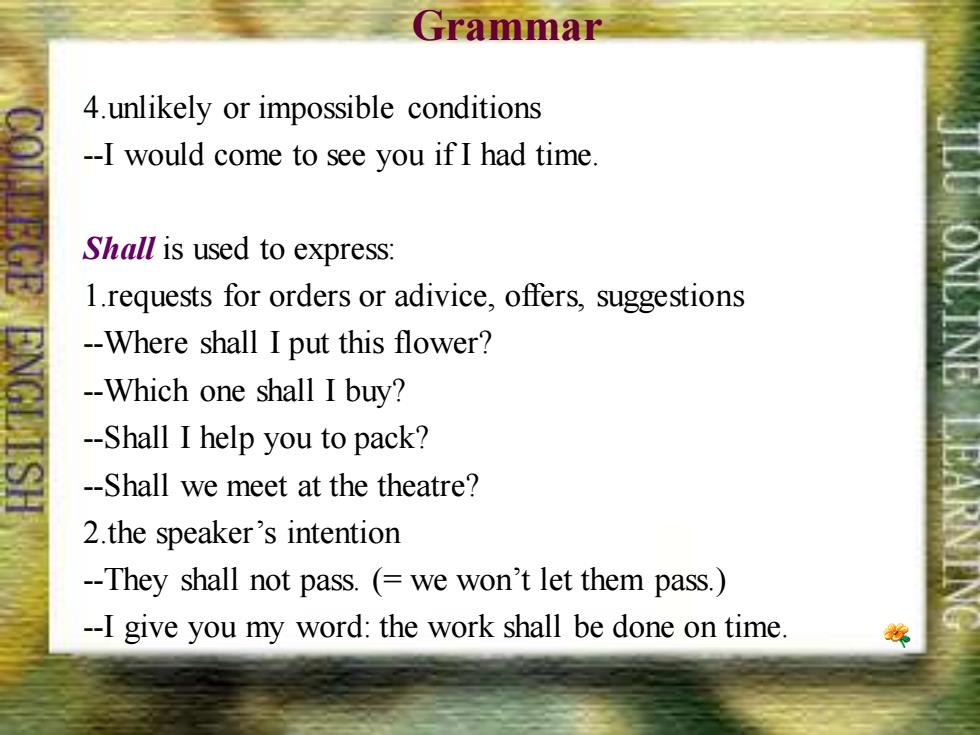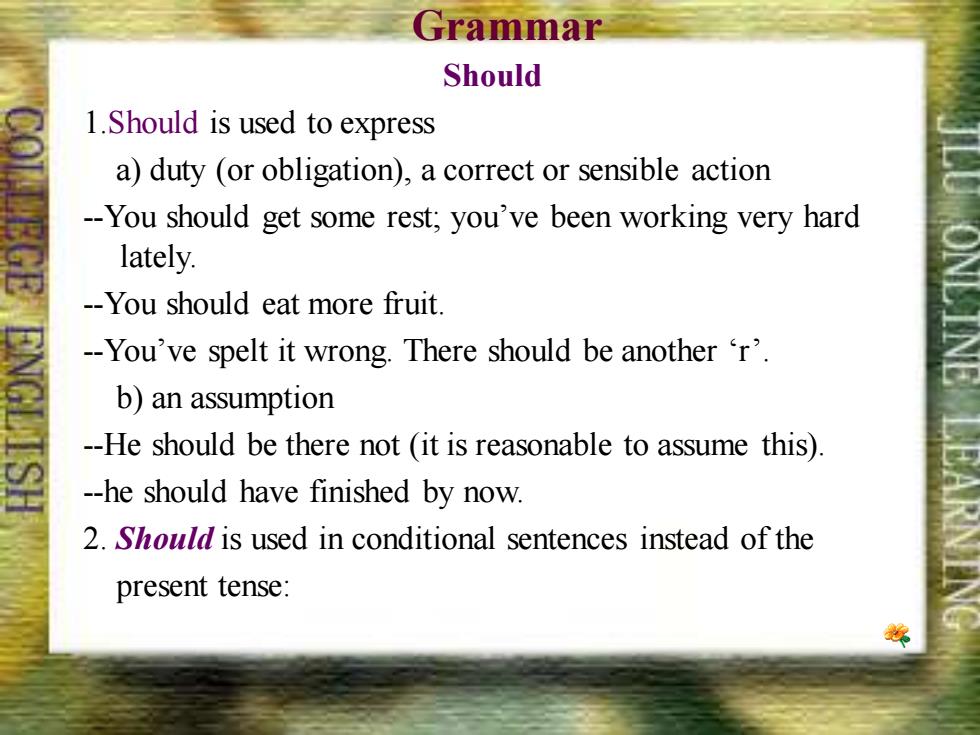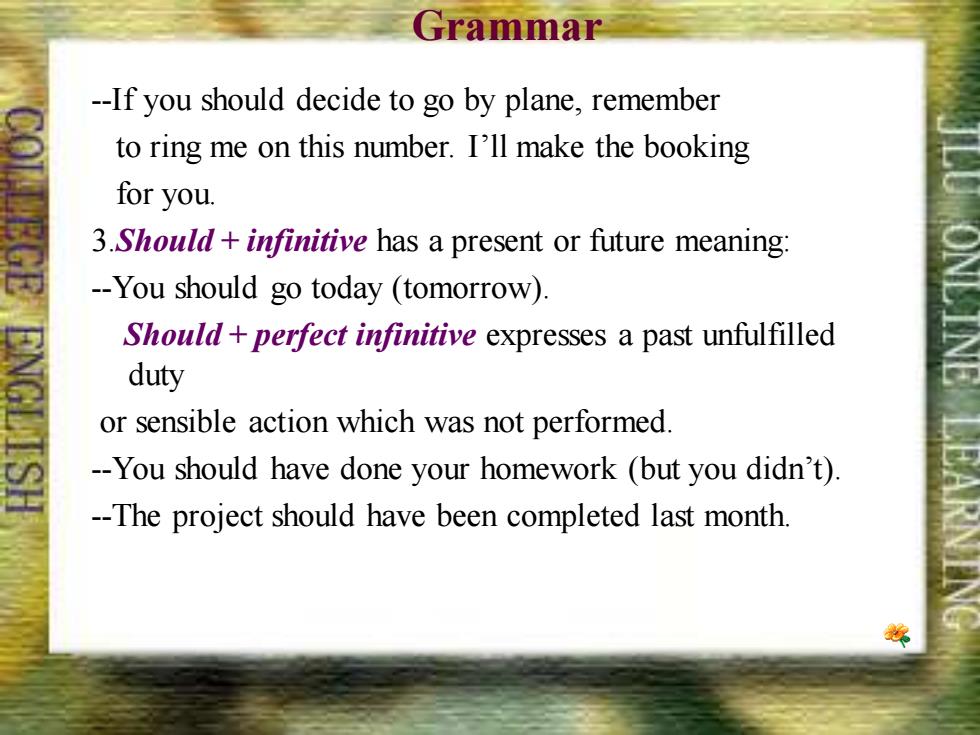
Grammar --The postman wouldn't give me your registered letter; he said it had to be delivered to you personally. Wouldn't is used for negative intention.) 2.polite requests --Would you please sign these papers? --Would you show me the way to the station?("Would you...?"is less authoritative and therefore more polite than “will y0u.?" 3.past habitual actions --When he had a problem to solve,he would work at it until he found an answer. --When John was a student,he and his friends would often stay up late discussing philosophy and politics
--The postman wouldn’t give me your registered letter; he said it had to be delivered to you personally. (Wouldn’t is used for negative intention.) 2.polite requests --Would you please sign these papers? --Would you show me the way to the station? (“Would you…?” is less authoritative and therefore more polite than “will you…?”) 3.past habitual actions --When he had a problem to solve, he would work at it until he found an answer. --When John was a student, he and his friends would often stay up late discussing philosophy and politics. Grammar

Grammar 4.unlikely or impossible conditions --I would come to see you if I had time. Shall is used to express: 1.requests for orders or adivice,offers,suggestions --Where shall I put this flower? --Which one shall I buy? --Shall I help you to pack? --Shall we meet at the theatre? 2.the speaker's intention --They shall not pass.(we won't let them pass.) --I give you my word:the work shall be done on time
4.unlikely or impossible conditions --I would come to see you if I had time. Shall is used to express: 1.requests for orders or adivice, offers, suggestions --Where shall I put this flower? --Which one shall I buy? --Shall I help you to pack? --Shall we meet at the theatre? 2.the speaker’s intention --They shall not pass. (= we won’t let them pass.) --I give you my word: the work shall be done on time. Grammar

Grammar Should 1.Should is used to express a)duty (or obligation),a correct or sensible action --You should get some rest;you've been working very hard lately. --You should eat more fruit. --You've spelt it wrong.There should be another'r'. b)an assumption --He should be there not(it is reasonable to assume this). --he should have finished by now. 2.Should is used in conditional sentences instead of the present tense:
Should 1.Should is used to express a) duty (or obligation), a correct or sensible action --You should get some rest; you’ve been working very hard lately. --You should eat more fruit. --You’ve spelt it wrong. There should be another ‘r’. b) an assumption --He should be there not (it is reasonable to assume this). --he should have finished by now. 2. Should is used in conditional sentences instead of the present tense: Grammar

Grammar --If you should decide to go by plane,remember to ring me on this number.I'll make the booking for you. 3.Should+infinitive has a present or future meaning: --You should go today (tomorrow). Should+perfect infinitive expresses a past unfulfilled duty or sensible action which was not performed. --You should have done your homework (but you didn't) --The project should have been completed last month
--If you should decide to go by plane, remember to ring me on this number. I’ll make the booking for you. 3.Should + infinitive has a present or future meaning: --You should go today (tomorrow). Should + perfect infinitive expresses a past unfulfilled duty or sensible action which was not performed. --You should have done your homework (but you didn’t). --The project should have been completed last month. Grammar

Grammar Exercise (page 223) 4.Fill in the blanks with one of the following modal verbs: can,may,might,will,would,should.Make it negative if necessary. 1)John gets upset when he cannot understand a problem 2)My pen is out of ink;will (or would)you let me use yours? 3)you'd better bring those clothes inside;it may (or might) rain. 4)I asked him for the keys,but he wouldn't give them to me. 5)If I were you,I would (or should)go for a swim now. 6)My landlady may(or might)not like coffee. 7)I'm sure they will do it if you ask them nicely. 8)You won't know my name,of course,but I was a friend of your father's
Exercise (page 223) 4. Fill in the blanks with one of the following modal verbs: can, may, might, will, would, should. Make it negative if necessary. 1)John gets upset when he understand a problem. 2)My pen is out of ink; you let me use yours? 3)you’d better bring those clothes inside; it rain. 4)I asked him for the keys, but he give them to me. 5)If I were you, I go for a swim now. 6) My landlady not like coffee. 7)I’m sure they do it if you ask them nicely. 8)You know my name, of course, but I was a friend of your father’s. cannot will (or would) may (or might) wouldn’t would (or should) may(or might) will won’t Grammar